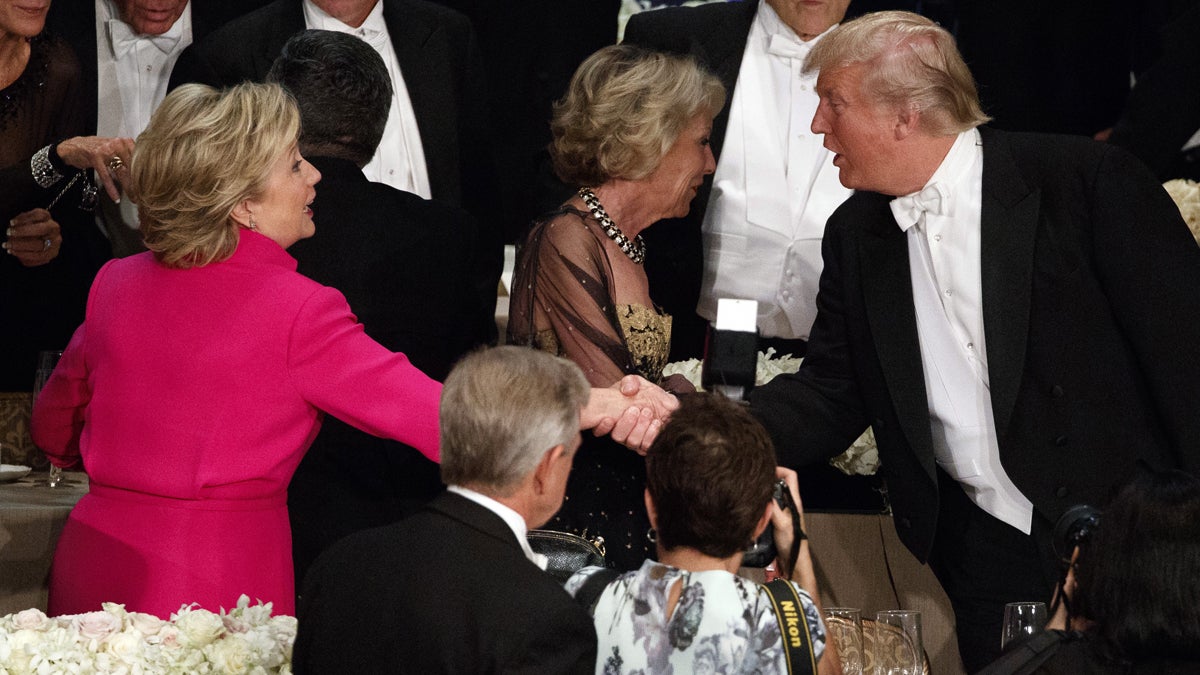Helpful, hospitable, and polite — in search of American good manners

Republican presidential candidate Donald Trump
In his book, “The Republicans,” Lewis L. Gould wondered if 1940 GOP nominee Wendell Wilkie was a forerunner to Donald Trump. After all, he said, both were wealthy businessman, charismatic, and against big government.
But there was a big difference: Wilkie would never have acted as boorishly as Trump has done toward Hillary Clinton. In fact, Wilkie once remarked that “the test of good manners is to be able to put up pleasantly with bad ones.”
In fact, that’s exactly what Hillary has done — meeting Trump’s barbs with mannered froideur.
For thousands of years people have been trying to define and describe what constitutes good manners. Thus for the ancient Greeks, keys to good manners and civility were versatility and grace; several Greeks and Romans, including Aristotle, Cicero, and Plutarch, wrote guides to good behavior. Both the Greeks and the Romans made much of manners while eating and drinking. Both drank to the health of their guests and both customs originated as a means of proving that the wine was not poisoned. To toast one’s dining companions stemmed from the mannerly habit of dipping toast in the wine to soften any acidity. Not that dining was always a mannered affair. Much advice was to be had about the issue — or even the desirability — of flatulence at meal times.
And the French believed that good manners were simply about putting others at ease. The late British Queen Mother had a particular talent for this: She was a master of looking intently at whoever she was speaking with and making them feel that they were the most important person in the world.
The Romans might have added dignity, something that many politicians and others who would impress, refer to as gravitas. In one respect only, the Romans were more civilized than the Greeks because of their high regard for women. In our own age, the habit of standing up when a woman enters the room, or of doffing the hat — a holdover from the custom of raising the visor in the presence of a lady — are a vestige of manners.
In America, the teaching of manners became an industry. Emily Post, a highly influential writer on the subject, said that manners are made up of trivialities of deportment which can be easily learned. William Penn published collections of maxims on personal and social conduct; and Benjamin Franklin’s popular Poor Richard’s Almanac was full of advice about proper manners and comportment. And George Washington, who had impeccable manners, wrote 110 rules under the title “Rules of Civility and Decent Behavior in Company and Conversation.”
But the doyenne of all advice on the subject, past and present, was Jane Austen, whose novels are awash in do’s and don’ts about manners. For instance “in a carriage, a gentleman takes the seat facing backward; if he is alone in a carriage with a lady, he does not sit next to her unless he is her husband, brother, or father. And the gentleman is always introduced to the lady — never the other way around. It is presumed to be an honor for the gentleman to meet her.”
So far as the lady is concerned, according to Ms. Austen, “under no circumstances may a lady call upon a gentleman alone unless she is consulting that gentleman on a professional or business matter; moreover, a lady does not wear pearls or diamonds in the morning and never dances more than three dances with the same partner.”
Sir Harold Nicolson, British author, biographer, diplomat, and husband of the poet Vita Sackville West, wrote a book called “Good Behavior” in which he said that “the development from egoism to consideration for others … is the foundation of all good manners.”
He and Vita invented the term “bedint.” This private word they used to connote behavior not only uncouth, but also arch and tasteless and certainly lacking in manners. They gave as an example, when they were traveling in France, spying a car with British plates on whose rear window was scrawled in lipstick: “Just married; no hand signals.” Today, one sees examples of bedint everywhere: people talking on cell phones while ignoring their fellow dinner companions; people playing loud music in their cars with the windows down.
There’s a difference between etiquette and good manners. Etiquette is connected to rules and protocol which vary in different countries and can be learned. Etiquette, by the way, comes from the word “ticket” — a book of notes about behavior.
And in “Good Behavior,” Nicolson, while focusing his remarkable intellect on the manners of older times and cultures, has much to say about modern American manners. He expresses admiration for a type of American civility, which is “a universal gift for being unfailingly helpful, hospitable and polite.” Moreover it is not a virtue confined to any particular class. Rather, he says, “it is a legendary beauty of the classless state.” In short, one might describe it as kindness in contrast to what he calls the distinctions and servitudes of Europe and other older civilizations.
Is the search for good manners in our society a futile one? Hardly. Pay attention, yes, to the anachronisms of Austen and others with their proscriptions about what constitutes manners … but then focus on kindness, concern for one’s fellows, and appreciation of the world at large as it is today not in old times. We can all drink to that. And maybe toast Wendell Wilkie while we’re at it.
—
David Woods, Ph.D., is a Philadelphia-based medical writer and editor. A former editor in chief of the Canadian Medical Association Journal, he is the author of four books and more than 200 articles, editorials, and reviews in peer-reviewed health care publications.
WHYY is your source for fact-based, in-depth journalism and information. As a nonprofit organization, we rely on financial support from readers like you. Please give today.




